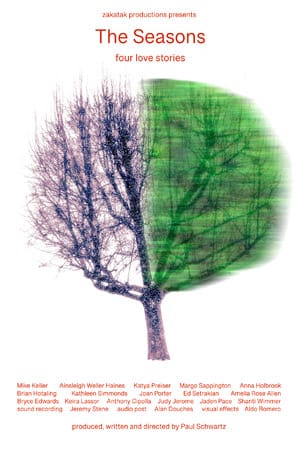WFA 2023 Home Schedule Explore the Film Guide Education Parties News+Reviews

Paul Schwartz’s The Seasons-Four Love Stories is a lovely anthology which documents four tales of romance and all the baggage that comes with it at four very different ages.
By Jahsh Durrant
See the feature film The Seasons – Four Love Stories on February 19 @2:15PM at Cinema Village (22 East 12th Street) as part of New York City’s 11th Annual Winter Film Awards International Film Festival. Tickets now on sale!
The Seasons – Four Love Stories is an anthology exploring love and how it changes over the years. Four short stories told over 80 minutes each covering a different season of the year where the changing protagonists age and the weather gets colder. It offers an intimate, often funny and sometimes emotional series of stories which although very different in execution feel similar in themes and help build off each other to create a cohesive vision of love and relationships at different stages in life.
The film, directed and written by Paul Schwartz, documents four romances at different stages of development from people across a variety of ages. We see a summertime love in its early stages where the couple are finding out if their initial attraction is enough to be a long-term relationship. There’s an older married couple who are growing detached leading to the wife suspecting her husband of cheating. An elderly woman in the winter reuniting with the man she at one point thought was the love of her life. Finally in the spring we see a young girl unable to control her emotions after falling in love for the first time.

Schwartz described finding the film’s concept from the relationship between his friends Mike Keller and Katya Preiser who played the couple in the Summer segment. The story of how their relationship formed served as the primary background which he expanded into the rest of the film. He combined that idea with a planned but canceled concept album he had based on the four seasons.
Talking about his inspiration Schwartz said “This film is much lighter than anything else I’ve done, and my impulse was that given how awful the last few years have been with the pandemic I wanted to make something touching and uplifting. I think we all can relate to the seasons of life and the seasons of love. Almost everyone that I’ve spoken with who has seen it references one section or another as something that particularly resonates with them.”
Indeed while all the stories are very different, one of the main constants is the relatability of each tale depending on your own individual experiences. Not that every story is something that you may experience in your life, but that the anxieties, regrets and general feelings of romance contained in each story are something that most people know. There’s a sense that each person in each story could almost be someone you know in real life; the emotions they feel are ones you can call back to. As such even with only twenty minutes per story, everything feels well-developed with the narrative easily filled by your own expectations of love and relationships.
 The four segments of the anthology are not necessarily created equal yet all of them manage to tie together perfectly and elevate one another. The stories are mostly self-contained and not narratively related but work perfectly thematically to emphasize the changing nature of how one approaches romance as they age. The initial bright and poppy feelings of your youth eventually give way to cold hard reality, to eventual fears of how you can maintain the relationship to the eventual regrets on how things may have gone differently.
The four segments of the anthology are not necessarily created equal yet all of them manage to tie together perfectly and elevate one another. The stories are mostly self-contained and not narratively related but work perfectly thematically to emphasize the changing nature of how one approaches romance as they age. The initial bright and poppy feelings of your youth eventually give way to cold hard reality, to eventual fears of how you can maintain the relationship to the eventual regrets on how things may have gone differently.
The shining storyline of the film is the winter section focusing on those regrets from the perspective of an elderly man and woman talking about their previous relationship which had ended decades ago. It’s the most basic and stripped down story, being just a conversation between the two of them at a restaurant with some flashbacks to their younger selves. Schwartz stated that the more basic back and forth was in part the result of keeping his older actors from overexerting themselves physically but it also helped a more intimate look into the relationship by ripping away all other potential plot elements making the relationship and dialogue the clear and only focus of the story.
Schwartz described the winter segment saying “Just from a story point of view, I was interested in the idea of those two characters revisiting a physical space they had last been in together 60 years ago, and how the memory of that space would inform their conversation. Plus both characters are literary professionals, so their natural way of behaving in the world is primarily verbal.”
Notably the film ends with the Spring segment focusing on a young girl which initially seems odd after the film has had its protagonists getting older as it moves along. However it does help end the film on a note which reminds why it’s worth it to go through so much heartache by showing that optimistic early years view of romance. The ending of the story also perfectly ties everything together.

Schwartz described the shoot as very long and hard as they needed to shoot each segment during the season in which they took place. This meant constantly restarting production over a period of ten months. While time-consuming it ultimately works by allowing each part of the film to properly feel like its respective season. The coldness of winter, warmer embrace of summer, the gloomy fall and brightness of spring all feel appropriate.
Another complication with the film, which was shot throughout 2021 and early 2022, was of course the continuing COVID pandemic. However Schwartz and the crew used this as a means to incorporate some of their feelings at the time back into the production. The summer segment especially focuses on a couple almost isolated from the rest of the world thanks to the pandemic.
It should be noted that while the film is more of a drama, it isn’t just long tirades on love and relationships. It is at multiple points quite funny and uplifting. The fall section especially has a running gag surrounding the wife having visions of her husband that is worth multiple good laughs. This film won’t make you sad or call back to failed relationships. It’s a journey into love and romance that acknowledges its lows while emphasizing the cheery emotions that make you want to love in the first place.
Overall The Seasons – Four Love Stories is a strong feature-length debut for Paul Schwartz. Showcasing four lovely, emotional and easy to understand tales of love and romance developing across one year. It’s more than the sum of its parts with each segment building on one another to deliver a powerful message on how and why romance is important to so many. That anyone of any age at any time wants that special someone by their side.
Summing up the film’s key theme, Schwartz says “I think the theme that love really knows no age is the underlying message.”

Jahsh Durrant
Jahsh Durrant is a freelance writer and journalist and lover of cinema. He has longed to understand and learn more about the world through writing and the avenues which it brings and is a fan of the big screen and the stories and emotions that can be explored through storytelling and the arts.
About Winter Film Awards
New York City’s 11th Annual Winter Film Awards International Film Festival runs February 16-25 2023. Check out a jam-packed lineup of 73 fantastic films in all genres from 21 countries, including shorts, features, Animation, Drama, Comedy, Thriller, Horror, Documentary and Music Video. Hollywood might ignore women and people of color, but Winter Film Awards celebrates everyone!
Winter Film Awards is an all-volunteer, minority and women-owned registered 501(c)3 non-profit organization founded in 2011 in New York City by a group of filmmakers and enthusiasts. Our mission is to promote diversity, bridge the opportunity divide and provide a platform for under-represented artists and a variety of genres, viewpoints and approaches. We believe that only by seeing others’ stories can we understand each other and only via an open door can the underrepresented artist enter the room.
Winter Film Awards programs are supported, in part, by public funds from the New York City Department of Cultural Affairs in partnership with the City Council and are made possible by the New York State Council on the Arts with the support of the Office of the Governor and the New York State Legislature. Promotional support provided by the NYC Mayor’s Office of Media & Entertainment.
For more information about the Festival, please visit winterfilmawards.com
